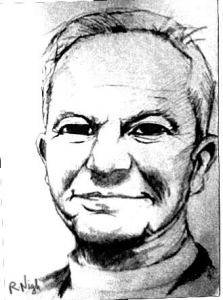Here is John Calvin commenting on Colossians 1:15:
The sum is this — that God in himself, that is, in his naked majesty, is invisible, and that not to the eyes of the body merely, but also to the understandings of men, and that  he is revealed to us in Christ alone, that we may behold him as in a mirror. For in Christ he shews us his righteousness, goodness, wisdom, power, in short, his entire self. We must, therefore, beware of seeking him elsewhere, for everything that would set itself off as a representation of God, apart from Christ, will be an idol. (John Calvin, “Commentaries on the Epistles of Paul the Apostle to the Philippians, Colossians, and Thessalonians,” trans. John Pringle, 150)
he is revealed to us in Christ alone, that we may behold him as in a mirror. For in Christ he shews us his righteousness, goodness, wisdom, power, in short, his entire self. We must, therefore, beware of seeking him elsewhere, for everything that would set itself off as a representation of God, apart from Christ, will be an idol. (John Calvin, “Commentaries on the Epistles of Paul the Apostle to the Philippians, Colossians, and Thessalonians,” trans. John Pringle, 150)
And on Philippians 2:6:
. . . As, then God is known by means of his excellences, and his works are evidences of his eternal Godhead, (Rom. I. 20,) so Christ’s divine essence is rightly proved from Christ’s majesty, which he possessed equally with the Father before he humbled himself. As to myself, at least, not even all devils would wrest this passage from me — inasmuch as there is in God a most solid argument, from his glory to his essence, which are two things that are inseparable. (John Calvin, “Commentaries on the Epistles of Paul the Apostle to the Philippians . . .,” 56)
Two eloquent statements, by Calvin, on (a.) Positive Theology, so that “knowledge of God” is limited to Christ alone — and not searching around for other “[sophist]icated” ways to talk about God (all you conceptually oriented scholastics out there). And (b.) on the relationship between the ontological/immanent nature of God, and the ‘evangelical’/economic nature of God. Calvin believed that the ‘works and miracles’ (“his glory”) are the external and univocal expression of His eternal being perichoretically united to the Father and the Holy Spirit. In other words, Calvin didn’t think that there was “a God behind the back of Jesus;” but that who Christ revealed Himself to be, was the ‘exact representation’ and externalization of the coinhering glory (Jn. 17) that He has always shared with the Father by the communion of the Holy Spirit. So as John the Evangelist records Jesus saying:
If ye had known me, ye also should have known my Father also: and from henceforth ye know him, and have seen him. 8. Philip saith unto him, Lord, shew us the Father, and it sufficeth us. 9. Jesus saith unto him, Have I been so long time with you, and yet hast thou not known me, Philip? He that hath seen me hath seen the Father; and how sayest thou then, shew us the Father? 10. Believest thou not that I am in the Father, and the Father in me? The words that I speak unto you I speak not of myself: but the Father that dwelleth in me, he doeth the works. 11. Believe me that I am in the Father, and the Father in me: or else believe me for the very works’ sake. John 14:7-11 KJV
This is all Calvin is getting at. When we do theology, when we work in the realm of “Christian epistemology,” we are strictly limited to doing Christology. If we want to know what the Father is like, if we want to talk about what God is like; then we are limited to looking at Jesus for all the proper boundaries and emphases that He wants us to know. Calvin would probably be appalled to see how his name has been applied to an theological methodology that has gone astray from this narrow framing provided by Calvin in his commentaries.
*A post from 2010
